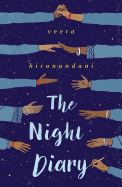
Veera Hiranandani, a South Asian Book Award Finalist for her The Whole Story of Half a Girl, partially based The Night Diary on her own Hindu father's family's experience during the "largest mass migration in history."
Nisha and Amil, her 12-year-old fraternal twin, are caught up in the Partition of India (creating the countries of India and Pakistan) in August 1947. But Nisha's story is more complicated than the Hiranandanis'. Her Muslim mother and Hindu father married against tradition. Mama gave birth to the twins and then died, leaving her Hindu husband to raise their Hindu/Muslim children. Nisha and Amil were brought up in a loving but incomplete family, which, as the book opens, includes their Hindu father and grandmother and a beloved Muslim male cook, Kazi. Nisha and Kazi have a close relationship and, for the twins' birthday, Kazi gives Nisha a diary as a present. Every night, Nisha uses the diary to confide in the mother she never knew; she writes about daily events, her dreams, her problems and her conflicts with her own heritage. One night, she poignantly yet fearfully writes: "If you were alive, would we have to leave you because you are Muslim?"
The diary is Nisha's record of the period from July to November 1947. She recounts her comfortable life as a doctor's daughter in a town where Hindus and Muslims got along, and follows that with the difficult trip--by train and then on foot. Young readers will need emotional maturity to read about the family's harrowing life on the road, although some lighthearted moments alleviate the harsh descriptions. And Nisha and Amil, with their individual interests, talents and convincingly changeable relationship, are protagonists sure to appeal to young readers. --Melinda Greenblatt, freelance book reviewer

